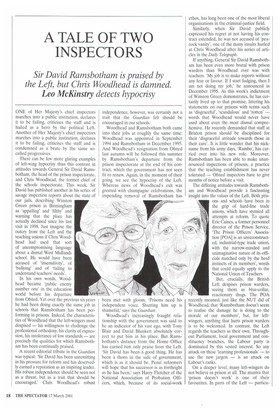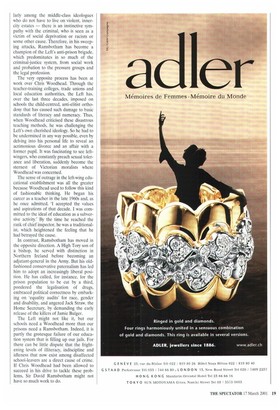A TALE OF TWO INSPECTORS
Sir David Ramsbotham is praised by the Left, but Chris Woodhead is damned.
Leo McKinstry detects hypocrisy
ONE of Her Majesty's chief inspectors marches into a public institution, declares it to be failing, criticises the staff and is hailed as a hero by the political Left. Another of Her Majesty's chief inspectors marches into a public institution, declares it to be failing, criticises the staff and is condemned as a brute by the same socalled progressives.
There can be few more glaring examples of left-wing hypocrisy than this contrast in attitudes towards General Sir David Ramsbotham, the head of the prison inspectorate, and Chris Woodhead. the former chief of the schools inspectorate. This week, Sir David has published another in his series of savage inspection reports about the state of our jails, describing Winston Green prison in Birmingham as 'appalling' and 'filthy' and warning that the place has actually declined since his last visit in 1998. Just imagine the outcry from the Left and the teaching unions if Chris Woodhead had used that sort of uncompromising language about a dismal West Midlands school. He would have been accused of 'insensitivity', of 'bullying' and of 'failing to understand teachers' needs'.
In his own words, Woodhead became 'public enemy number one' in the education world before his departure from Ofsted. Yet over the previous six years he had been doing exactly the same job in schools that Ramsbotham has been performing in prisons. Indeed, the characteristics of Woodhead that the left-wingers most despised — his willingness to challenge the professional orthodoxy, his clarity of expression, his intolerance of low standards — are precisely the qualities for which Ramsbotham has been continually praised.
A recent editorial tribute in the Guardian was typical: 'Sir David has been unremitting in his pressure for reform and has deservedly earned a reputation as an inspiring leader. His robust independence should be seen not as a threat, but as a trait that should be encouraged.' Chris Woodhead's robust independence, however, was certainly not a trait that the Guardian felt should be encouraged in our schools.
Woodhead and Ramsbotham both came into their jobs at roughly the same time: Woodhead was appointed in September 1994 and Ramsbotham in December 1995. And Woodhead's resignation from Ofsted last autumn will be followed this summer by Ramsbotham's departure from the prison inspectorate at the end of his contract, which the government has not seen fit to renew. Again, in the moment of their going, we see the hypocrisy of the Left. Whereas news of Woodhead's exit was greeted with champagne celebrations, the impending removal of Ramsbotham has been met with gloom. 'Prisons need his independent voice. Shutting him up is shameful,' says the Guardian.
Woodhead's increasingly fraught relationship with the government was said to be an indicator of his vast ego, with Tony Blair and David Blunkett absolutely correct to put him in his place. But Ramsbotham's distance from the Home Office has earned him only praise from the Left. 'Sir David has been a good thing. He has been a thorn in the side of government, which is as it should be. Penal reformers will hope that his successor is as forthright as he has been,' says Harry Fletcher of the National Association of Probation Officers, which, because of its social-work ethos, has long been one of the most liberal organisations in the criminal-justice field.
Similarly, when Sir David publicly expressed his regret at not having his contract extended, he was not accused of 'peacock vanity', one of the many insults hurled at Chris Woodhead after his series of articles in the Daily Telegraph.
If anything, General Sir David Ramsbotham has been even more brutal with prison warders than Woodhead ever was with teachers. 'My job is to make reports without any fear or favour. If I start fudging, then I am not doing my job,' he announced in December 1995. As this week's indictment of Winston Green demonstrates, he has certainly lived up to that promise, littering his statements on our prisons with terms such as 'disgraceful', 'scandalous' and 'rotten' — words that Woodhead would never have used about even the most dismal comprehensive. He recently demanded that staff at Brixton prison should be disciplined for their 'disgraceful attitude towards those in their care'. It is little wonder that his nickname from his army days, 'Rambo', has carried over into his new role. Moreover, Ramsbotham has been able to make unannounced inspections of prisons, a practice that the teaching establishment has never tolerated — Ofsted inspectors have to give months of notice before a visit.
The differing attitudes towards Ramsbotham and Woodhead provide a fascinating insight into the values of the Left. Both prisons and schools have been in the grip of hard-line trade unions, which have stymied all attempts at reform. To quote Eric Caines, a former personnel director of the Prison Service, 'The Prison Officers' Association [PON is an unreconstructed, industrial-type trade union, with the narrow-minded and unimaginative nature of its officials matched only by the herd instincts of its members', words that could equally apply to the National Union of Teachers.
But, crucially, the British Left despises prison warders, seeing them as blue-collar, reactionary thugs. The POA recently moaned, just like the NUT did of Woodhead, that ‘Ramsbotham doesn't seem to realise the damage he is doing to the morale of our members', but, for leftwingers, anything that hurts prison warders is to be welcomed. In contrast. the Left regards the teachers as their own. Throughout Parliament, local government and constituency branches, the Labour party is dominated by this vested interest. So any attack on these 'learning professionals' — to use the new jargon — is an attack on Labour's ranks.
On a deeper level, many left-wingers do not believe in prison at all. The mantra that 'prison doesn't work' is one of their favourites. In parts of the Left — particu larly among the middle-class ideologues who do not have to live on violent, innercity estates — there is an instinctive sympathy with the criminal, who is seen as a victim of social deprivation or racism or some other cause. Therefore, in his sweeping attacks, Ramsbotham has become a champion of the Left's anti-prison brigade, which predominates in so much of the criminal-justice system, from social work and probation to the pressure groups and the legal profession.
The very opposite process has been at work over Chris Woodhead. Through the teacher-training colleges, trade unions and local education authorities, the Left has, over the last three decades, imposed on schools the child-centred, anti-elitist orthodoxy that has caused such damage to basic standards of literacy and numeracy. Thus, when Woodhead criticised these disastrous teaching methods, he was challenging the Left's own cherished ideology. So he had to be undermined in any way possible, even by delving into his personal life to reveal an acrimonious divorce and an affair with a former pupil. It was fascinating to see leftwingers, who constantly preach sexual tolerance and liberation, suddenly become the sternest of Victorian moralists where Woodhead was concerned.
The sense of outrage in the left-wing educational establishment was all the greater because Woodhead used to follow this kind of fashionable thinking. He began his career as a teacher in the late 1960s and, as he once admitted, 'I accepted the values and aspirations of that decade. I was committed to the ideal of education as a subversive activity.' By the time he reached the rank of chief inspector, he was a traditionalist, which heightened the feeling that he had betrayed the cause.
In contrast, Ramsbotham has moved in the opposite direction. A High Tory son of a bishop, he served with distinction in Northern Ireland before becoming an adjutant-general in the Army. But his oldfashioned conservative paternalism has led him to adopt an increasingly liberal position. He has called, for instance, for the prison population to be cut by a third, pondered the legalisation of drugs, embraced political correctness by embarking on 'equality audits' for race, gender and disability, and angered Jack Straw, the Home Secretary, by demanding the early release of the killers of Jamie Bulger.
The Left might not like it, but our schools need a Woodhead more than our prisons need a Ramsbotham. Indeed, it is partly the grotesque failure of our education system that is filling up our jails. For there can be little dispute that the frightening levels of illiteracy, indiscipline and idleness that now exist among disaffected school-leavers are a direct cause of crime, If Chris Woodhead had been allowed to succeed in his drive to tackle these problems, Sir David Ramsbotham might not have so much work to do.



































































 Previous page
Previous page